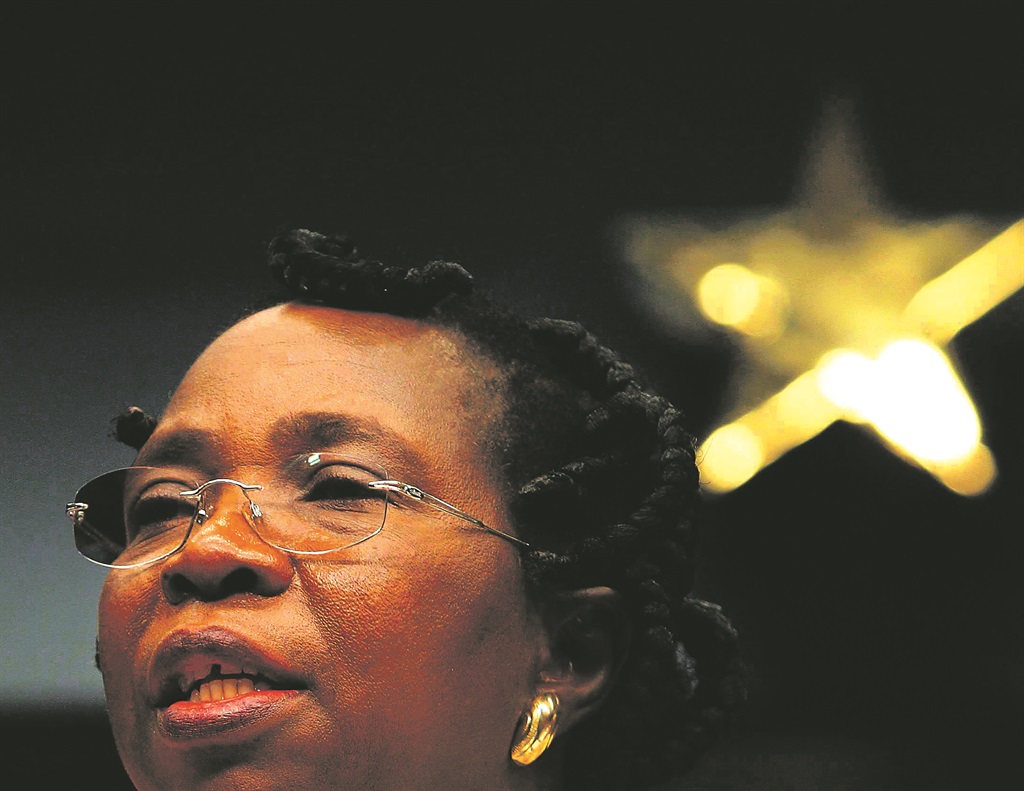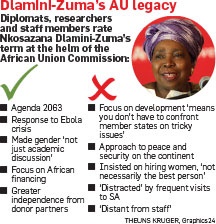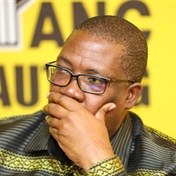
While hailed for initiating Agenda 2063 and funding reforms, some regard the AU Commission chair as a remote leader who failed to overcome the constraints of her post
For the first time in its 14-year history, the African Union (AU) is holding a closed summit, excluding external development partners – the politically correct term for donors – from its gathering of 54 heads of state.
The summit, under way in the Rwandan capital of Kigali, should be AU Commission chairperson Nkosazana Dlamini-Zuma’s last, if all goes according to plan.*
Closing the summit to partners is viewed as a positive aspect of her legacy.
Ambassador Mull Katende of Uganda said: “She put in writing that she wanted partners like the European Union [EU] to stay away from the July summit, so that we could talk without the interference of external meetings.
“She said that we could engage with partners during the January summit.”
I met Katende, also the dean of ambassadors from the east African region, at the Ugandan embassy in Addis Ababa. I had gone to Ethiopia to speak to diplomats, academics, civil society and staff at the AU to assess Dlamini-Zuma’s performance as chairperson of the organisation’s secretariat, after it became clear that she had not submitted her application for a second term.
This led to widespread speculation that she had her sights set on replacing President Jacob Zuma.
If she succeeds, in addition to making history by becoming the first woman to head the continental body, Dlamini-Zuma will become the first female president of South Africa.
Some sources declined to speak on the record. Diplomats and staff said they were not authorised to speak; civil society members said they did not want to jeopardise their organisation’s relationship with the AU; and staff said they wanted to protect their jobs. Seven staff members participated on condition of anonymity.
Great expectations
There was broad agreement that the expectations of Dlamini-Zuma were very high. Her reputation for reform during her tenures as minister of foreign affairs and then of home affairs in South Africa preceded her – and in some instances, it is the basis of disappointment with her.
But, for others, it is the nature of the AU that undermines transformation.
“Even if you put Jesus Christ there, you can only go so far,” said Ghana’s ambassador Albert Ekow Yankey, who is also dean of ambassadors for the west African regional grouping Ecowas.
The feeling was echoed by Yann Bedzigui, a researcher at the Institute for Security Studies based in Addis Ababa: “Despite her aura, she still encountered the same difficulties as her predecessors; even [Nelson] Mandela would not have made a difference.”
Some of those constraints include funding. The AU has been heavily reliant on external partners such as the EU to fund its programmes. It has now come up with a formula that will see member states fund the entire operations budget.
By 2022, the commission would like partners to fund 75% of the programme budget and member states to contribute 25% to financing peace operations.
Finding money for a broke organisation was part of the reason for this week’s closed-door meeting. Heads of state met for a retreat to agree on ways to find African money to fund the AU.
Things reportedly got so bad last year that salaries for AU staff were delayed because of late contributions by member countries. Just 19 out of 54 member countries paid their contributions, which are assessed on the basis of the size of economies.
Although funding for the AU has been on the table for years, Dlamini-Zuma is credited with refocusing the attention of member states on domestic sources of finance for the organisation.
The rationale behind this is for African countries to take responsibility for the AU, and to reduce the effect of funding partners’ interests on continental priorities.
Suggestions over the years have included imposing levies on air travel and oil, expanding the number of countries that contribute the most to the AU, and redirecting funds recovered from illicit financial flows to the AU Commission.
While African diplomats generally shared this view, ascribing the closed summit and focus on alternative sources of finance to values shaped by her time in South Africa’s liberation struggle, some staffers – who have to implement AU decisions and commitments – did not.
One complained of “knee-jerk, anti-Western, ANC baggage”; others said their boss should have lined up alternative sources of funding first before locking out partners.
Agenda 2063
There is universal celebration of Dlamini-Zuma for developing Agenda 2063: The Africa We Want, a framework that envisions developments in Africa over the next 50 years.
The vision was first unveiled in 2013 when the AU marked the 50th anniversary of continental union.
Agenda 2063 is to be implemented in 10-year phases, and has 10 touchstones for each phase, such as an integrated high-speed train network; a Madiba Nelson Mandela Decade of Reconciliation in Africa (2014 to 2024); and what promises to be popular with Africans travelling within Africa – an African passport.
Dlamini-Zuma’s supporters in Addis Ababa see Agenda 2063 as proof of strategic thinking, addressing poverty, resource distribution and other root causes of conflict, focusing on the long term rather than the short term.
“It is her biggest deliverable,” said the outgoing EU representative, ambassador Gary Quince. “For the first time, the AU has a blueprint and a vision.”
Ghana’s Yankey said: “She will leave; others will come in. The amazing foundation she has built will be strengthened. But it will be very sad if Agenda 2063 is allowed to fizzle.”
But while the ISS’s Bedzigui agrees with the long-term benefits of Agenda 2063 for Africans, he also thinks it allows for avoidance.
“Focusing on development means you do not have to confront member states on tricky issues such as democracy and governance … the AU is not a developmental organisation.”
Ebola
Whether the AU is a developmental organisation or not, its response to the outbreak of Ebola in 2014 – a crisis neither violent nor political – has been widely lauded and attributed to Dlamini-Zuma’s background as a medical doctor.
Dlamini-Zuma led the AU’s collaboration with Africa’s private sector to create the Africa Against Ebola campaign, which raised $34 million (R496 million) to fund the AU’s Ebola mission.
Ambassador Ismael Koroma, Ebola-struck Sierra Leone’s deputy permanent representative to the AU, said the intervention of the AU Support to the Ebola Outbreak in West Africa mission was “a plus for Madam Zuma”.
“The way the AU moved in ... at a time when the whole world was saying, ‘We have given up on Sierra Leone, Liberia and Guinea’, and the projection was that by January 2015 it was going to be a disastrous situation for those countries....”
An AU medical volunteers corps is now on the cards.
Relentless on gender
Dlamini-Zuma is not just the first South African to head the continental body, she is also the first woman. Since declaring 2015 the Year of Women’s Empowerment, three AU summits – including this week’s one in Rwanda – have focused on women.
“She has been relentless on gender so that it is not just an academic discussion,” Ghana’s Yankey told me.
“She introduced a gender scorecard”, he added, to monitor the progress of member states on commitments to gender inclusion.
However, male and female staffers complained that “her insistence on hiring women and not necessarily the best person” has compromised work at the commission headquarters and at AU offices.
Micromanager or reformer?
Meticulous and insistent on high standards of service, is how Ghana’s Yankey described Dlamini-Zuma.
The EU’s Quince said: “One of her biggest successes is the financial and administrative reform. She has pushed the AU Commission forward, bringing it close to international standards over the past four years.”
But, as with any assessment of the management of a public organisation, there are sceptics. Staffers and diplomats, who asked to remain unnamed to protect their positions, described a chairperson distracted by frequent visits to South Africa: “She was never around,” one staffer said.
“She doesn’t trust anybody. It stops the organisation from working ... so she blocks things, scratches out things line by line,” said another.
“Her absences left management gaps, a suspicious relationship with staff and poor decision-making. It has reached a level where the organisation has become extremely dysfunctional, but that’s not entirely her fault; it’s also because of the rules of the organisation she inherited,” said a third.
Some diplomats also described a chairperson distant from her staff with poor social skills, particularly when juxtaposed against the gregariousness of predecessors.
Uganda’s Katende recalled an incident early in Dlamini-Zuma’s term: “We got a note that any visitor – including [members of] the AU’s permanent representatives committee – wanting to see her must first fill out a form, which had provision for the seeker’s profile. Many representatives did not like that. After some time, she withdrew it following criticism that it was unbecoming behaviour.”
Benin’s ambassador Naim Akibou commented on her inner circle: “There is a shadow cabinet made up of the Southern African Development Community; these are the real powers. So, the configuration of her cabinet would make some people less likely to cooperate with her.”
In Dlamini-Zuma’s defence, other staffers said, she had to stop the AU from conducting business as usual.
“She scrutinises and questions things. People don’t like those sorts of questions; they think because she’s the boss, she should just approve.
“That kind of management and leadership is what the AU needs. It is that kind of finesse that produces the professionalism we need,” said one.
Al Jazeera, the global news network based in Qatar, reported last year that it had Wikileaks cables showing that there was a death threat against Dlamini-Zuma when she took up her position at the AU in 2012. As a result, her security was tightened – and some staff cited the threat and the bolstered security as the reason for her distance.
One staffer praised her for “seriously and sustainably trying to address issues of finance, streamlining the organisation and summits by being more focused”.
Challenges
The rules governing the hiring and firing of staff at the AU Commission make life difficult for its chairperson.
There is a quota system in place governing geography, linguistics and gender. So, in the words of one staffer: “You cannot get rid of incompetent people.”
A staffer, speaking off the record, explained: “The ambassadors will come and follow you, asking you why you are targeting their country. You will never see them at the AU except when they are pushing for their hires or protecting their people.
The attitude of member states is also a constraint.
Dlamini-Zuma pushed for military intervention after the stalemate over a third term for Burundi’s president, Pierre Nkurunziza, turned bloody.
Bedzigui said she failed to convince member states. One staffer said: “This was the first time that the AU was being kicked out of a country.”
The start of Dlamini-Zuma’s tenure coincided with an upsurge in conflict and third-term attempts by Burundi, Burkina Faso and the Democratic Republic of Congo.
Yankey said: “She took principled decisions on terrorism and Boko Haram … she politely but forcefully reminded President Barack Obama of the US’s obligation to Libya regarding Nato’s action there.”
Yet Dlamini-Zuma draws fire for her approach to peace and security on the continent. One visibly frustrated staffer suggested that she should visit Somalia, which has the largest number of AU troops, as UN secretary-general Ban Ki-moon has done.
To overcome the constraints that come with the office of AU Commission chair, some argue, requires a former head of state to occupy the position – following the precedent established with the commission’s first head, former Malian president Alpha Oumar Konaré.
Unlike a former foreign minister, a former head of state - the argument goes - would be able to speak and act more robustly with their former peers, who make up the Assembly of Heads of State – the top decision-making organ of the AU.
But another diplomat provided this caveat: “The heads of state did not like the way Konaré used to speak to them, and that’s why you see that they now pick a foreign minister for that position.”
Leaving the AU
The AU Commission chair heads a secretariat that implements decisions that heads of member states take.
The office of the commission chairperson confers no distinct advantage to its occupant beyond national and international prestige, access to global decision-making and the opportunity to construct a more inclusive environment for millions of Africans on the continent and the diaspora to dream and live better lives.
Dlamini-Zuma’s election was divisive, protracted and, according to some diplomats and staff, left scars that are still visible. By aggressively fronting her against the then incumbent, Jean Ping of Gabon, South Africa broke two unwritten rules: firstly, that no big country – or none of the so-called big five (Algeria, Egypt, Nigeria, Libya, South Africa) – would bid for the leadership of the commission because of their already sizeable influence. And secondly, that the top posts at the AU Commission would never be occupied by officers from the same linguistic zone – in this case, anglophone countries.
Given Dlamini-Zuma’s years of service in the liberation struggle, in South Africa’s government and at the AU Commission, and her fractious election to the post of chairperson, there was surprise from some diplomats that she had chosen to leave Addis Ababa to return home.
Her departure would leave South Africa without any senior representation at the AU as the country is not fielding any candidates for the eight top-level positions available at the commission.
Yankey said: “I was in complete bewilderment that she was leaving, given the passion with which she has driven Agenda 2063 and the 50th anniversary celebrations.”
On her legacy, Bedzigui said Dlamini-Zuma had positioned the AU strategically for the long term.
Akibou said: “She is a Pan-African with good intentions who wanted to mark her chairmanship, but she found structures difficult to change and an organisation that was not ready to accompany her.”
*News24 reports Dlamini-Zuma's departure might be delayed for six months if a worthy successor isn't elected.
Amimo is a journalist and current affairs host on Citizen TV, Kenya. She covered Ethiopia and the African Union for the BBC from 2009 to 2011




 Publications
Publications
 Partners
Partners









